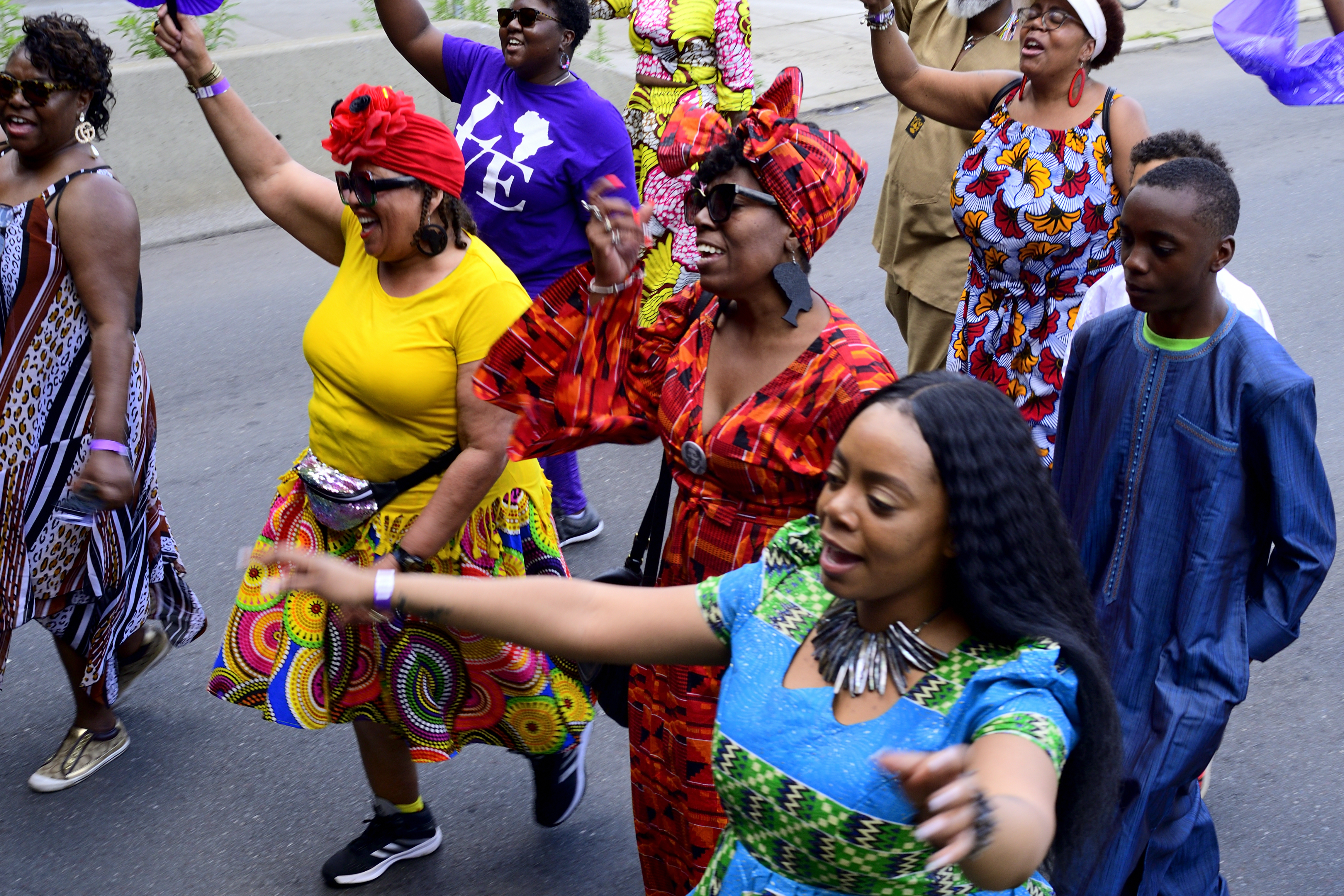Say "Juneteenth" to Kelly Navies and it evokes childhood memories of warm summers and warmer family celebrations. Her father was a pioneering educator in the field of Black studies. So Juneteenth, which commemorates the end of slavery in the United State, and its cultural significance to Black history was woven into Navies' being from the time she was old enough to walk.
"When I was growing up it was a day in summer we looked forward to with excitement. 'Juneteenth is coming!' It was like a family reunion atmosphere where your entire extended family would come because we would invite everyone," said Navies, who today serves as museum specialist/oral historian with the Smithsonian National Museum of African American History and Culture in Washington, D.C.
"My father would invite his students and they would bring their families and extended families. Everyone would show up at up at our house for a big feast and BBQ and a wonderful program of live music and poetry and song," she said. "It was just a fun time."
But if you didn't grow up in a household like Navies' that emphasized the importance of Juneteenth, you're probably not alone. Cliff Robinson, the founder of Juneteenth.com, told NBC News the fact that the holiday has gone unheralded for so long is a direct reflection of our current social climate.
“The fact that many Americans don’t know what Juneteenth is is exactly why we’re at this space right now," Robinson said. "This is seen as an addendum to American history, these are footnotes, yet they’re critical turning points for the country as a whole."
Juneteenth Coverage
For many white Americans, recent protests over police brutality have driven their awareness of Juneteenth's significance. Prompted largely by the protests that have gripped much of the nation following the deaths of George Floyd, Rayshard Brooks, Breonna Taylor and Ahmaud Arbery, there's been a renewed push by individual states and a growing number of corporations to recognize Juneteenth, even as plans for a federal holiday have remained in neutral.
Senator Cory Booker, D-N.J., Sen. Kamala Harris, D-Calif., and other Democrats on Friday introduced legislation to commemorate Juneteenth as a federal holiday. The move comes after Republican Sen. John Cornyn of Texas said he also planned to introduce a similar bill, NBC News reported.
As of Thursday, organizers with the Movement for Black Lives said they had registered more than 275 Juneteenth weekend events across 45 states, through its website.
Just this week, New York Gov. Andrew Cuomo made Juneteenth a holiday for state employees this year. He said he'd seek to make it a state holiday as of 2021. Cuomo's announcement came a day after Virginia Gov. Ralph Northam announced he would propose making Juneteenth an official holiday in the state. Northam was embroiled in his own racial scandal in 2019, when he apologized for appearing in blackface in his college yearbook.
Corporate America is responding as well. This year, the National Football League and companies including Twitter, Spotify, Lyft, Nike, Twitter, Uber and Tegna have all recognized Juneteenth as a company holiday. Target said in a statement it plans to honor "the oldest nationally celebrated commemoration of the ending of slavery in the United States" and will give team members "space to honor Juneteenth in their own way. "
In a memo, NFL commissioner Roger Goodell said he wants staff to use June 19 as a day to “reflect on our past but, more importantly, consider how each one of us can continue to show up and band together to work toward a better future.”
President Donald Trump even contributed to the discussion, though probably not as he had intended. Trump initially announced that his first MAGA rally following the pandemic shutdowns would occur in Tulsa, Oklahoma, on June 19, seemingly unaware of the significance of it happening on Juneteenth. The backlash was swift, not only because of the date, but because in 1921 Tulsa was the site of one of the deadliest race riots in American history, where historians now believe as many as 300 Black people were killed, according to the Tulsa Historical Society and Museum.
Trump's decision received scathing backlash from many circles, including Rep. Karen Bass, D-Calif., chairwoman of the Congressional Black Caucus, who said holding a rally in Tulsa on June 19 "is disrespectful to the lives and community that was lost during the Tulsa race riot." In a rare retreat, Trump backed down, moving the rally to June 20.
What is Juneteenth?
Juneteenth gets its name from the combination of June and Nineteenth and is celebrated annually on June 19. It's also called Emancipation Day and Freedom Day. Abraham Lincoln signed the Emancipation Proclamation on Jan. 1, 1863, announcing enslaved people "shall be then, thenceforward, and forever free," but the proclamation didn’t immediately apply in certain areas, including secessionist states like Texas, which had left the Union and joined the Confederacy during the Civil War.
It took another two years for the change to be enacted in Texas. The Civil War ended in April 1865 and two months later, on June 19, 1865, Maj. Gen. Gordon Granger of the Union Army issued General Order No. 3 in Galveston, Texas, with Granger saying, "The people of Texas are informed that, in accordance with a proclamation from the Executive of the United States, all slaves are free."
Over the years there have been other pushes to formally acknowledge Juneteenth. The late Rep. Al Edwards of Houston, a Democratic congressman, wrote and sponsored a bill calling for "Emancipation Day in Texas" to be recognized as a "legal holiday." He filed Bill 1016 in February 1979 and it passed in the Texas House of Representatives and Texas Senate the following May. Texas Republican Gov. William Clements signed the bill in June 1979 and the bill officially went into effect on Jan. 1, 1980.
Navies says Juneteenth came back into popular consciousness in 1968 during the civil rights era when events such as the Poor People's March on Washington were organized to gain economic justice for poor people in the U.S. She believes current social events have brought us full circle.
"Now, of course, we're in another very important time in our country when these issues are coming to the surface and Juneteenth is becoming significant again to people, because it gives them a chance to come together, people of all ages, and reflect on the question of why are we in this moment are so fraught with racial conflict," she said.
Congressional representatives have introduced multiple bills to make Juneteenth a federal holiday, unsuccessfully so far. Groups and activists, like the National Juneteenth Observation Foundation and Opal Lee of Texas, continue to petition the federal government to make Juneteenth a national holiday.
Born Oct. 7, 1926 in Marshall, Texas, Lee has been a leading voice in her community to see Juneteenth recognized as a federal holiday. And, at 93 years of age, she's still hopeful it will happen in her lifetime.
"It is as important as the Fourth of July. In fact, I dream someday they celebrate from the 19th to the fourth, like they do Mardi Gras," said Lee.
The nonagenarian is heartened by the demonstrations and renewed national interest in making Juneteenth a federal holiday. It's an effort to which she has devoted much of her life.
"I've been doing this for over 40 years. I think I'd have give up by now if I didn’t think it was going to happen," Lee said. "The administration we have now is just a bump in the road. We are going to have it as a federal holiday, and then we can talk reparations. But first you have to get people to understand where we came from."
Navies agrees, saying, "Federal holidays are important because that means there's been an acknowledgment of a particular event on a national level." But she also believes the conversation is a larger one. The daughter of an educator, Navies believes the public school system has been lacking in its teaching not only about Juneteenth, but in African American history in general.
It's a sentiment echoed by Lee, who has also authored a children's book "Juneteenth: A Children's Story."
"If we don't teach our children about our past we are doomed to repeat it. That’s what's happening to us now," she said. "I'm planning to be here when Juneteenth is a federal holiday."
Robinson told NBC News that he has seen far more attention on his Juneteenth.com website this year as more companies have reached out to him asking for speakers to provide virtual educational seminars on the significance of the holiday.
“I think that's a real take on the way things are transpiring now, a different way of doing things,” he said. “For many, many years there’s been a push for a national holiday, which hasn't taken root yet. But this is an interesting way to do the same thing.”



